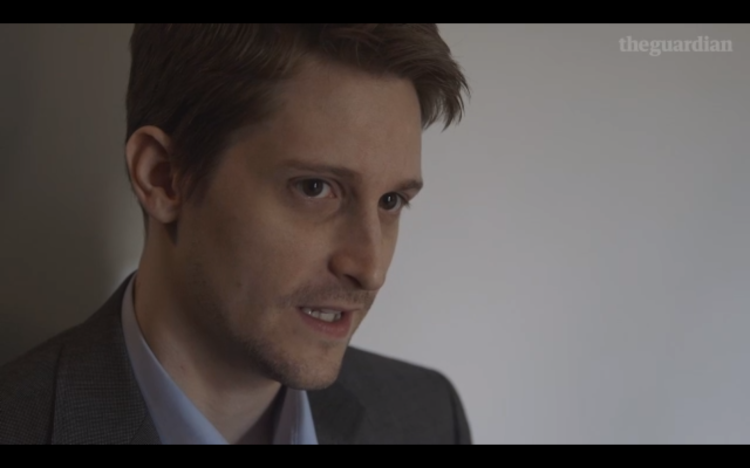He looks like a man with a lot on his mind. Thinner. Jacketed, but not well-slept.
On July 10, Edward Snowden — possibly the biggest whistle-blower in history — gave an interview to The Guardian editor Alan Rusbridger and reporter Ewen MacAskill in Moscow.
In the 13-minute talk, the former National Security Agency contractor said he was resigned to someday being imprisoned at Guantanamo Bay, that he’s not a Russian spy, and that Google Hangouts has been totally infiltrated by U.S. intelligence. (You can read the transcript here.)
The pale-faced Snowden further disclosed that he had reached out to U.S. officials about getting a fair trial in the States “and they declined.” In the interview, which was filmed inside a Moscow flat, Snowden said he was “very fortunate” to have received asylum in Russia.
When asked by the interviewer if he thought technology was compatible with privacy, Snowden, 31, said yes.
“Absolutely. Technology can actually help increase privacy, but not if we sleepwalk into new applications of it. … There shouldn’t be a distinction between digital information and printed information.”
He vehemently denied being a Russian spy and said his former NSA bosses would have known it the moment U.S. intelligence assets suddenly went quiet. His denials don’t jibe with former KGB major general Oleg Kalugin, who exclusively told VentureBeat that Snowden was working for Russian intelligence.
Kalugin, for his part, did not provide proof. See my interview and story on Kalugin here.
When asked how his Russian was coming along, Snowden laughed and declined to speak a sentence for the camera.
“The last thing I need is clips of me speaking Russian floating around on the Internet,” he said.
Later, Snowden was asked about cloud computing.
“Do you think this is the end of cloud computing?” the interviewer asks.
“I don’t,” Snowden said. “What cloud companies need to pursue to be truly successful is what’s called a ‘zero knowledge’ system, which means the service provider host process content on behalf of customers. But they don’t actually know what it is.”
“That’s the only way they can prove to customers that they can be trusted with their information.”
Snowden laughed when asked if he used Google and Skype. He said no, because both company’s had been thoroughly compromised, so he avoided them.
Snowden is wanted by U.S. authorities on charges of espionage. He is currently thought be living on the outskirts of Moscow.


